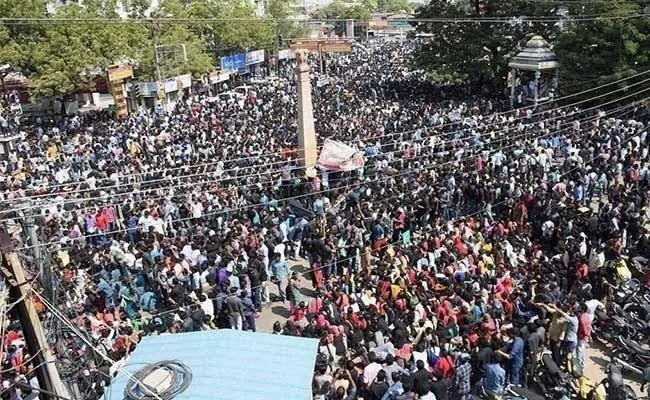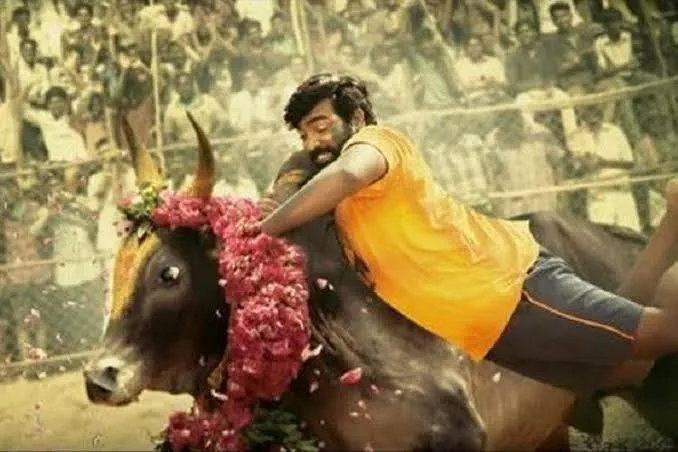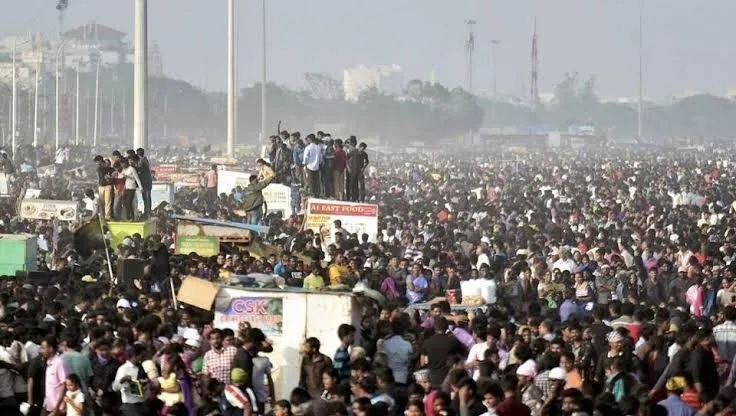
JALLIKATTU
Jallikattu  is cited as one of the last available ways to promote and preserve[95][96] the native livestock because the other uses of native breeds such as ploughing, breeding via mating and milk is on decline due to advancement in mechanization by tractors, improvement in artificial insemination and hybrid Jersey cows respectively.[96] Karthikeyan Siva Senaapathy, a native breed activist, has said in an interview with the BBC that "[Tamil Nadu] had over one million Kangayam bulls in 1990. The population has fallen to 15,000 now."[95][96] Minor protests were initiated by cattle rights activists and farmers such as Karthikeya Sivasenapathy who has appeared multiple times on the STAR Vijay talk show Neeya Naana. Music videos, such as "Takkaru Takkaru" by Hiphop Tamizha, and on Facebook videos to talk about jallikattu and its benefits inspired the protestors.[97][98][99] Sivasenapathy has claimed that the indigenous cattle bulls are critically endangered in Tamil Nadu and banning jallikattu will have the adverse effect of wiping them out completely.[100][101] According to Sivasenapthy and other pro-jallikattu activists, jallikattu is not just a sport that is deeply entrenched in Tamil culture, but it has also inadvertently served as a scientific method of breeding cattle.[clarification needed] This view is held among a majority of jallikattu supporters.[102][103] The protest is aimed at revival of the native humped bull, called the zebu. The Tamil Nadu breed of zebu is unique to India and has several advantages compared to European varieties of cattle such as the Holstein cow. The native breeds are rich in the A2 variety of beta casein protein which aides easy digestion whereas milk from European Bos taurus contain the A1 variant of the beta casein protein which is related to allergies and some serious health conditions.[104] The Holstein breeds found their way into India as a result of Operation Flood of late 1960's through cross breeding to increase the low milk yield of native breeds. As the Jersey cow can yield nine times the quantity of milk as a zebu in the same period, there is concern among protesters that without jallikattu providing an economic incentive for the breeding of zebu, the breed will become endangered and eventually extinct.[79] PETA disputes the allegation that outlawing jallikattu would lead to a loss of the Tamil Nadu zebu, stating that the bulls can still be used as studs regardless of whether jallikattu is legal or not.[105]
is cited as one of the last available ways to promote and preserve[95][96] the native livestock because the other uses of native breeds such as ploughing, breeding via mating and milk is on decline due to advancement in mechanization by tractors, improvement in artificial insemination and hybrid Jersey cows respectively.[96] Karthikeyan Siva Senaapathy, a native breed activist, has said in an interview with the BBC that "[Tamil Nadu] had over one million Kangayam bulls in 1990. The population has fallen to 15,000 now."[95][96] Minor protests were initiated by cattle rights activists and farmers such as Karthikeya Sivasenapathy who has appeared multiple times on the STAR Vijay talk show Neeya Naana. Music videos, such as "Takkaru Takkaru" by Hiphop Tamizha, and on Facebook videos to talk about jallikattu and its benefits inspired the protestors.[97][98][99] Sivasenapathy has claimed that the indigenous cattle bulls are critically endangered in Tamil Nadu and banning jallikattu will have the adverse effect of wiping them out completely.[100][101] According to Sivasenapthy and other pro-jallikattu activists, jallikattu is not just a sport that is deeply entrenched in Tamil culture, but it has also inadvertently served as a scientific method of breeding cattle.[clarification needed] This view is held among a majority of jallikattu supporters.[102][103] The protest is aimed at revival of the native humped bull, called the zebu. The Tamil Nadu breed of zebu is unique to India and has several advantages compared to European varieties of cattle such as the Holstein cow. The native breeds are rich in the A2 variety of beta casein protein which aides easy digestion whereas milk from European Bos taurus contain the A1 variant of the beta casein protein which is related to allergies and some serious health conditions.[104] The Holstein breeds found their way into India as a result of Operation Flood of late 1960's through cross breeding to increase the low milk yield of native breeds. As the Jersey cow can yield nine times the quantity of milk as a zebu in the same period, there is concern among protesters that without jallikattu providing an economic incentive for the breeding of zebu, the breed will become endangered and eventually extinct.[79] PETA disputes the allegation that outlawing jallikattu would lead to a loss of the Tamil Nadu zebu, stating that the bulls can still be used as studs regardless of whether jallikattu is legal or not.[105] 
Support from various groups, including film actors, politicians, cricketers and other sportsmen, social activists, and authors. Raghava Lawrence, Director V. Gowthaman, Seeman, Samuthirakani, Ameer, RJ Balaji, Aari, Mansoor Ali Khan and G. V. Prakash Kumar took part actively during the protests. Spiritual leaders like Sri Sri Ravi Shankar, and Sadhuguru Jaggi Vasudev[106] also spoke in support of the sport.[107] The protestors rejected any attempt for leadership by politicians and celebrities and wished to remain a leaderless mass movement.
On 19 January 2017, film composer A. R. Rahman announced that he will observe a day-long fast in support of the protesters, and for 'Tamil Nadu's spirit'.[106]
Opposition Edit
The main opposition of jallikattu comes from the Indian branch of the international non-governmental organization People for the Ethical Treatment of Animals (PETA). PETA's opposition is also shared by the Animal Welfare Board of India (AWBI), Federation of Indian Animal Protection Organisations and Compassion Unlimited Plus Action (CUPA).[108][109] Judges of the Supreme Court of India have likewise criticized the Indian Central Government's support of jallikattu just because it is a tradition and have voiced their opposition of it.[86] The Supreme has held that the sport is inherently cruel in nature and this deprives the animal of its basic right to live without subject to fear and torture. The judgement also clarifies that the sport is neither religious ritual nor an